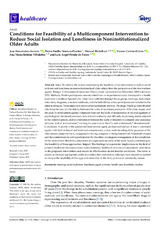Mostrar el registro sencillo del ítem
Conditions for Feasibility of a Multicomponent Intervention to Reduce Social Isolation and Loneliness in Noninstitutionalized Older Adults
| dc.contributor.author | Hernández Ascanio, José | |
| dc.contributor.author | Ventura Puertos, Pedro E. | |
| dc.contributor.author | Rich Ruiz, Manuel | |
| dc.contributor.author | Cantón-Habas, Vanesa | |
| dc.contributor.author | Roldán-Villalobos, Ana María | |
| dc.contributor.author | Pérula de Torres, Luis Ángel | |
| dc.date.accessioned | 2022-06-14T08:35:10Z | |
| dc.date.available | 2022-06-14T08:35:10Z | |
| dc.date.issued | 2022 | |
| dc.identifier.uri | http://hdl.handle.net/10396/23137 | |
| dc.description.abstract | Aims: To identify the factors conditioning the feasibility of an intervention to reduce social isolation and loneliness in noninstitutionalized older adults from the perspective of the intervention agents. Design: A Dimensional Grounded Theory study conducted from December 2019 to January 2020. Methods: Twelve participants were recruited from an experimental study developed in a health district of a southern Spanish city. Data were collected through focus group meetings, individual interviews, biograms, anecdote notebooks, and the field diaries of two participants not included in the other techniques. Transcripts were analyzed using thematic analysis. Findings: Findings were divided into three themes: (a) the elderly between the walls of loneliness, economic difficulties, losses, and the past; (b) intervention agents/volunteers between the walls of inexperience in the management of psychological/emotional processes, lack of moral authority, and difficulty in planning results adapted to the (elderly) person; and (c) intervention between the walls of (interest in) company and assistance at home, lack of involvement (“waiting for you to save them”), and withdrawal/“abandonment”. Conclusion: A profile of the specialized intervention agent, professionalized (or at least a mentored agent), with both technical and relational competencies; a clear understanding of the purposes of the intervention (empowerment, as opposed to having company or being helped with household chores) and the commitment to active participation by the elder; or adequate management of the completion of the intervention (flexibility, attachment management) are some of the main factors contributing to the feasibility of these approaches. Impact: The findings have potential implications in the field of primary healthcare because primary and community healthcare services can implement corrections to the proposed intervention and ensure its effectiveness under feasible conditions. The nurse is shown as the most appropriate profile to conduct this intervention, although more research is needed to analyze the feasibility of this type of intervention in the daily practice of community nurses. | es_ES |
| dc.format.mimetype | application/pdf | es_ES |
| dc.language.iso | eng | es_ES |
| dc.publisher | MDPI | es_ES |
| dc.rights | https://creativecommons.org/licenses/by/4.0/ | es_ES |
| dc.source | Healthcare 10(6), 1104 (2022) | es_ES |
| dc.subject | Nursing | es_ES |
| dc.subject | Social isolation | es_ES |
| dc.subject | Loneliness | es_ES |
| dc.subject | Aged | es_ES |
| dc.subject | Primary health care | es_ES |
| dc.subject | Feasibility studies | es_ES |
| dc.title | Conditions for Feasibility of a Multicomponent Intervention to Reduce Social Isolation and Loneliness in Noninstitutionalized Older Adults | es_ES |
| dc.type | info:eu-repo/semantics/article | es_ES |
| dc.relation.publisherversion | https://doi.org/10.3390/healthcare10061104 | es_ES |
| dc.relation.projectID | Junta de Andalucía. AP-0079-2016 FPS 2014 | es_ES |
| dc.rights.accessRights | info:eu-repo/semantics/openAccess | es_ES |

